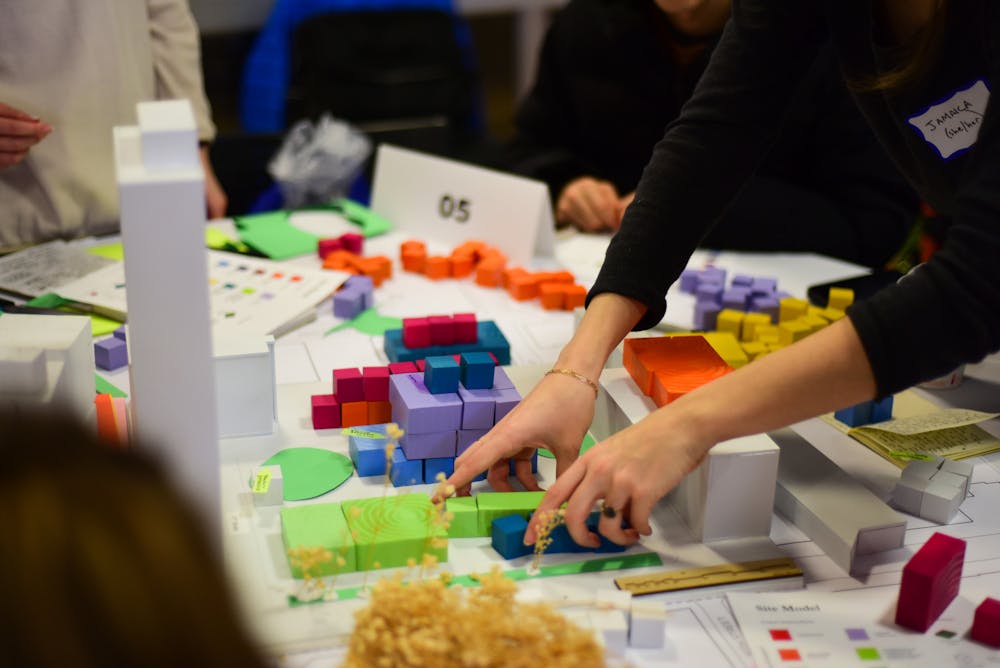Penn faculty led a public design workshop to reimagine the site of the proposed Philadelphia 76ers arena near Chinatown.
The Jan. 27 workshop — which had over 75 attendees — was organized by City Planning and Urban Studies professor Domenic Vitiello, Architecture professor Rashida Ng, and Graduate School of Education research coach Mary Yee. The event aimed to convene planners, designers, and people with non-architectural backgrounds to reimagine alternative uses for the proposed 76ers arena site.
On July 21, 2022, Philadelphia 76ers co-owners Josh Harris and David Blitzer, and developer and Campus Apartments Chief Executive Officer David Adelman announced their plans to build a new arena for the 76ers in the city's Fashion District. The proposal has generated opposition and caused protests, including among Penn students, and the majority of Chinatown residents oppose the arena's construction.
“This is what the city should’ve done five years ago,” Asian Americans United cofounder Debbie Wei said in her welcome remarks at the event. “This time, the American oligarchs cannot be saved by their money.”
The workshop was held at the Center for Architecture and Design and cosponsored by the Save Chinatown Coalition. It focused on addressing the 76ers plans that have been in the works since 2022 to transform the 1000 blocks of Filbert and Market Streets in the Fashion District of Center City into a new basketball arena.
In a statement to The Daily Pennsylvanian, a spokesperson from 76DevCo criticized the workshop's representation of the project. They described the proposed arena as "a critically important $1.55 billion investment that aims to support and revitalize an essential economic hub of Center City."
"We respect community dialogue and view it as an important cornerstone of the development process; however, some of the organizers of the project have consistently used bad faith tactics to misrepresent the project," the spokesperson wrote.
The workshop included information on the site's historical context and findings from a survey that was disseminated to Chinatown residents on their hopes for the site's future. There were also two one-hour rotations, which gave attendees the chance to discuss tangible plans for the area.
RELATED:
Philadelphia 76ers’ arena proposal near Chinatown and Penn student protests, explained
In Photos: Protesters march from Chinatown to City Hall, opposing proposed 76ers arena
One group created scale models of ideas for the site, another looked at artificial intelligence images of plans designed based on the responses to the survey, and a third focused on adaptive reuse through drawings of bird's-eye views of potential building ideas, Ng told The Daily Pennsylvanian.
“Many people I have spoken to over the last year and a half seem to think that there’s no other ideas out there for reusing the Fashion District,” Vitiello said. “In some ways, [the event] is a response to that. Surely, Philadelphians can come up with lots of other ideas.”
Several students from Penn’s Departments of Architecture and City Planning assisted with the organization of this event and have helped research the impacts the arena would have on the city, Ng added.
Candidate for a master's in architecture Jess Wong, who is writing her thesis on the “larger concept of Chinatowns,” said that the workshop is a way to "help facilitate new ideas and new proposals" to address Chinatown's "history of struggles."
“Each table has a design professional and a graduate student, and this is a mix of some of the ideas from community members and then design professionals putting their hands into it within conversation with the people at the table,” Wong said.
Yee presented findings from a survey distributed by the Save Chinatown Coalition to Philadelphia residents living both within and outside of Chinatown at the workshop. The survey collected over 2,200 total responses.
“There's so many people in Philadelphia who have strong feelings about the arena,” Yee said. “This is in the context of the city having basically no imagination and not doing the kind of due diligence to understand why the Fashion District has failed. If you don’t know what the conditions are for it to succeed, why would you go ahead and entertain this arena proposal from the 76ers?"
At the event, Vitiello also spoke on the need to "dream bigger and demand better development, especially in such public places."
“This is an existential threat to Philadelphia’s Chinatown because we’ve seen it,” he said, referring to Washington’s Chinatown, which saw a decline in Asian population after the construction of Capital One Arena, formerly MCI Center, in 1997.
The workshop took place amid continued controversy surrounding the proposed 76ers arena. A meeting of the Civic Design and Review Committee in December resulted in five hours of public comment against the arena proposal. The 76ers have since announced that they gathered over 30,000 signatures on petitions supporting the plans to build the arena.
“It’s an amazing fight,” candidate for a master's in architecture and master's in landscape architecture Kelvin Vu said. “It’s really important that we have spaces to dream together, to talk together, to agree, to disagree. I think making those spaces is just as important as making the actual architecture.”
College junior and workshop participant Faith Applegate, a lifelong Philadelphia resident, grew up going to Chinatown and is a student-teacher at Folk Arts-Cultural Treasures Charter School in Chinatown. She told the DP that the arena proposal "promotes chaos."
“People talk in Philadelphia a lot about safety, but I don’t think an arena exactly promotes safety,” Applegate said. “If we really structure the way we plan communities around what communities need, rather than what we think they need, I think we would be a lot better off."
In the next few weeks, Ng, Vitiello, and other collaborators will be analyzing the results of the survey and the ideas from the workshop. Vitiello will also lead an effort to conduct a financial feasibility study.
Editor’s note: This article has been updated to include a statement from 76DevCo.









